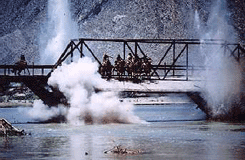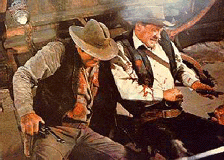|
Newest Reviews:
New Movies -
The Tunnel
V/H/S
The Tall Man
Mama Africa
Detention
Brake
Ted
Tomboy
Brownian Movement
Last Ride
[Rec]³: Genesis
Hara-Kiri: Death of a Samurai
Indie Game: The Movie
Abraham Lincoln: Vampire Hunter
Old Movies -
Touki Bouki: The Journey of the Hyena
Drums Along the Mohawk
The Chase
The Heiress
Show
People
The Strange Affair of Uncle Harry
Pitfall
Driftwood
Miracle Mile
The Great Flamarion
Dark Habits
Archives -
Recap: 2000,
2001, 2002,
2003, 2004
, 2005, 2006,
2007 , 2008
, 2009 ,
2010 , 2011 ,
2012
All reviews alphabetically
All reviews by star rating
All reviews by release year
Masterpieces
Screening Log
Links
FAQ
E-mail me
HOME
| |
The Wild Bunch
(Sam Peckinpah) 1969
 An astonishing amount of thought obviously went into Sam Peckinpah’s The
Wild Bunch. In some ways, the movie seems to act as group therapy, healing
the pain caused by the many liberties taken by the Western genre before (and
after) its release. The film contains a vast amount of unsubtitled Spanish,
there are few among the cast that can be considered conventionally attractive,
the landscape looks gritty instead of pretty, and when people get shot they
bleed profusely. It's a thoroughly modern movie, and has barely aged a bit since
its release, since it places itself in opposition to all things past.
Radicalism, it seems, never grows old. Yet, at the same time that its polemic is
at its most furious, there’s a strangely sad feeling in the air that an era is
ending. The film’s ironic ending, which suggests this lifestyle can continue
somehow, seems the one fraudulent note in the film, especially when compared to
the resolution of The Seven Samurai, which obviously inspired much of
what we see here. The run down group of bandits that the film follows is nearing
the end of its robbing days, whether they want it that way or not. Set in 1913,
the characters sense old age, technology, and world war will soon overtake their
relevance. When a car wheels onto the screen, it seems an anachronism and an
affront to their way of life. There’s thematic significance to even the
film’s smallest details, and that depth of field in Peckinpah’s vision is
admirable.
An astonishing amount of thought obviously went into Sam Peckinpah’s The
Wild Bunch. In some ways, the movie seems to act as group therapy, healing
the pain caused by the many liberties taken by the Western genre before (and
after) its release. The film contains a vast amount of unsubtitled Spanish,
there are few among the cast that can be considered conventionally attractive,
the landscape looks gritty instead of pretty, and when people get shot they
bleed profusely. It's a thoroughly modern movie, and has barely aged a bit since
its release, since it places itself in opposition to all things past.
Radicalism, it seems, never grows old. Yet, at the same time that its polemic is
at its most furious, there’s a strangely sad feeling in the air that an era is
ending. The film’s ironic ending, which suggests this lifestyle can continue
somehow, seems the one fraudulent note in the film, especially when compared to
the resolution of The Seven Samurai, which obviously inspired much of
what we see here. The run down group of bandits that the film follows is nearing
the end of its robbing days, whether they want it that way or not. Set in 1913,
the characters sense old age, technology, and world war will soon overtake their
relevance. When a car wheels onto the screen, it seems an anachronism and an
affront to their way of life. There’s thematic significance to even the
film’s smallest details, and that depth of field in Peckinpah’s vision is
admirable.
 The opening salvo in which a bank robbery turns sour is
especially impressive. The assault that Peckinpah hits the audience with is
thoroughly impressive in its comprehensive look at how one group of bandits can
tear a town apart and vice versa. It isn’t exactly subtle, and the montage
aesthetics sometimes are too rambunctious to provide a clear sense of coherency,
but chaos that’s put on screen is nevertheless impressively orchestrated. The
movie continues to astound throughout its running time, following each set piece
with sharply observed moments of bonding and brawling between the outlaws. The
lack of clear moral judgement in the film is surprising. Even the “good
guys” are sleazy here. The only moments where a sense of honor rears its head
come from the “bad guys”. Clearly Peckinpah thinks such moral simplicity is
inadequate, and its inclusion in this genre, where the good guys are supposed to
wear white and the bad guys have to wear black is rebuffed heavily here. He sees
the assumption that times were simpler back then as unwarranted condescension. The
Wild Bunch forges an uneasy alliance with the audience because of its
refusal to turn itself over to easy answers to the questions that it poses. No
consistent moral center exists. The audience rides with these bad boys with only
our memories of reality to ground us morally. The filmmaking sometimes becomes
so adept and encompassing, however, that we lose ourselves and cheer on the
carnage. The infusion of intelligence that usually follows such outbursts allows
us to feel good about it afterwards.
The opening salvo in which a bank robbery turns sour is
especially impressive. The assault that Peckinpah hits the audience with is
thoroughly impressive in its comprehensive look at how one group of bandits can
tear a town apart and vice versa. It isn’t exactly subtle, and the montage
aesthetics sometimes are too rambunctious to provide a clear sense of coherency,
but chaos that’s put on screen is nevertheless impressively orchestrated. The
movie continues to astound throughout its running time, following each set piece
with sharply observed moments of bonding and brawling between the outlaws. The
lack of clear moral judgement in the film is surprising. Even the “good
guys” are sleazy here. The only moments where a sense of honor rears its head
come from the “bad guys”. Clearly Peckinpah thinks such moral simplicity is
inadequate, and its inclusion in this genre, where the good guys are supposed to
wear white and the bad guys have to wear black is rebuffed heavily here. He sees
the assumption that times were simpler back then as unwarranted condescension. The
Wild Bunch forges an uneasy alliance with the audience because of its
refusal to turn itself over to easy answers to the questions that it poses. No
consistent moral center exists. The audience rides with these bad boys with only
our memories of reality to ground us morally. The filmmaking sometimes becomes
so adept and encompassing, however, that we lose ourselves and cheer on the
carnage. The infusion of intelligence that usually follows such outbursts allows
us to feel good about it afterwards.
* * * *
02-12-02
Jeremy Heilman
|